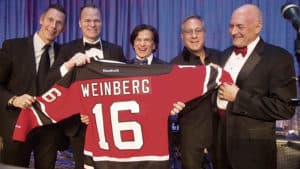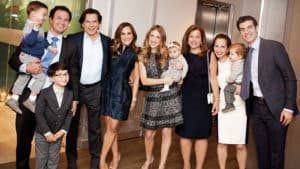Daniel Straus’s conference room probably would lend itself to a metaphor — but to come up with it, a visitor would have to stop gawking at the view first.
The office is high above the George Washington Bridge, on the Fort Lee side. It offers a hypnotic view of traffic; on a good traffic day you watch as cars, trucks, and buses shoot from the bridge and hurl themselves at the spaghetti bowlful of lanes. On a bad day — a day, say, for traffic problems in Fort Lee — you’d get to see a panorama of fuming drivers from your Olympian perch.
The most compelling thing about the inherently mesmerizing view is that it is of constantly changing motion within an unchanging structure. It’s a dance of fluidity and solidity.
Meanwhile, the conference room smells scrumptiously of brand-new furniture, all leather and polish. It’s not a new room or a new office, Daniel Straus of Englewood said. He’s been there for years. But the conference room has just been remodeled. “The key is to keep it new,” he said.
And there’s the metaphor. Mr. Straus, who has come to care a great deal about health care, particularly as it applies to the elderly, has run many successful businesses, moving from field to field but always retaining a focus on the elderly, on the health care system in general — and on the Jewish community.
He’s not a doctor; he is a lawyer but he doesn’t practice as one. Instead — and as well as being a generous philanthropist, a highly successful venture capitalist, a real estate developer, an owner of a basketball team, the Memphis Grizzlies, and an unstoppable entrepreneur — he owns CareOne, a big tristate area rehabilitation and senior living company whose well-tended buildings are visible all over northern New Jersey.
Mr. Straus also is an Orthodox Jew, deeply tied to his community; he’s the son, the brother, father, and most recently the grandfather of a family that is rooted in the American Jewish life.

Mr. Straus was born in 1956 in Boro Park, Brooklyn. His father, Joseph, was born in 1912. In 1922 Joseph Straus and his mother fled to Brooklyn from Uman, the legendary town that attracts hordes of chasidim every year as they follow the trail of Nachman of Bratslav. The Strauses were not Braslavers. Instead, they were refugees from the Bolshevists.
When they arrived in Brooklyn, the Straus’ were reunited with Joseph’s father, who had left first. His father drove a laundry truck; Joseph was the first in his family to go to college. He graduated from the then-almost-brand-new Yeshiva University with rabbinic ordination and then went on to NYU’s law school.
During World War II, Joseph Straus was a chaplain, not for the armed forces but for the USO, stationed in Ogden Utah, and then in Cheyenne, Wyoming. “He was a conscientious objector and a vegetarian,” his son said. That was unusual for his time; he came home with many stories.
Joseph Straus’s wife — Daniel’s mother — also had stories. Born Gwendolyn Goldstein in 1918, she grew up in Williamsburg, lived through the Depression, and uncharacteristically for her time and place, she went to college, graduating from Brooklyn College. Her family owned a hat factory; “they were fairly prosperous until the Depression, when they weren’t any more,” Daniel said. (The hat company still exists, he added; cousins own it now.) She earned a bachelor’s and then a master’s degree in teaching, and taught second and third grade in Brooklyn public schools.
After the war, Joseph and Gwendolyn married and moved to Boro Park, where he practiced as a lawyer, tried his hand as a politician, and began to develop a reputation as someone who knew everybody and therefore was useful for everybody to know. “He was very involved with the Democratic party, and he ran for office a couple of times,” Mr. Straus said. “He was well known in Brooklyn at the time.
“He was a general practitioner, which means he was like the community lawyer for Boro Park,” he continued. “You try to explain what a general practitioner is today, and nobody can understand it.” Just as general practitioner physicians used to take on all cases, sending patients to specialists only when it was necessary, so too general practitioner lawyers would take all the cases that came their way. Their expertise was broad, and their relationships were deep.
“It’s not like today where you have to turn people down because you don’t agree with their ideology,” Mr. Straus said. “He would represent the very Orthodox, and the Conservative.” In fact, he added, his father’s college roommate went on to become a Conservative rabbi, and the two remained friends. It wasn’t so long ago, but the world was different then, Mr. Straus said. It was less divided. “My family was strictly Orthodox, but it’s not that the rules then were more relaxed — they weren’t — but people didn’t look down on everybody else.”
The Straus family “went to the Young Israel of Boro Park,” Mr. Straus said. “My father was very involved with the religious Zionists, and my mother was very involved with Amit. She used to volunteer all the time.”
Because of his parents’ involvement, “we had parlor meetings in our house all the time, where dignitaries would come to talk.” The subject often was the still-new state of Israel, which always took up a big part of the Straus family’s collective heart.
Mr. Straus went to the Yeshiva Eitz Chaim in Boro Park for elementary school, and then to BTA, YU’s Brooklyn-based high school. College was at Columbia, and then law school at NYU.
Just as he followed his father’s lead by going to law school at NYU, Mr. Straus entered the business his father had found congenial — nursing homes (as they were called then. Today there are skilled nursing, assisted living, and independent living facilities). His father, introduced to that world because he represented nursing home owners, bought some in Connecticut and New Jersey; when he died unexpectedly in 1978, Daniel — who had been working as a lawyer at Paul Weis in Manhattan — and his brother Moshael took them over. “We formed a management company” — Multicare Companies — “to operate the nursing facilities that our father left us,” Mr. Straus said. “Over a period of 12 years, we built it up. It was sold in 1997 as a publicly traded company.” (The buyer was Genesis Health Systems.) That year, Mr. Straus pointed out, the New York Times quoted a health care analyst, Peter J. Sidoti, as saying that the Straus brothers’ firm was “a jewel in the nursing home business, in quality of care and quality of management measured by earnings growth and stock price appreciation.”
“It was sold for a princely sum,” Mr. Straus said. (According to the Times, it was $1.06 billion, in cash.) Repeating his quote in the New York Times, “We made a lot of money for a lot of people,” he said.
Mr. Straus was only 40 years old —barely middle-aged — when Multicare was sold; the drive and energy that had gotten him so far would not allow him to retire then. “I have been a serial entrepreneur ever since,” he said. “A lot of the businesses I operate are in health care. I’m also in real estate, and some of that is in health care — I buy and build my own nursing homes and assisted living homes, pharmacies, a hospice, a home care agency. I am also the principal owner and chairman of a large medical insurance company in Puerto Rico, and one in California. I have owned doctor’s practices.”

The medical insurance company, InnovaCare Health, is a managed health plan that is “committed to providing quality health care by creating sustainable, cost-effective models that are fully-integrated with today’s most advanced technologies,” its website says.
And of course there is CareOne, which he founded soon after selling Multicare. CareOne, which has facilities throughout the Northeast, and particularly in New Jersey, is the region’s largest provider of housing, rehabilitation, medication, and other services for the elderly.
“A lot of the investing I do is not in health care, but it started that way,” Mr. Straus said.
Some of his investments are entirely unrelated to health care. Mr. Straus owns real estate, including brownstones right next to Manhattan’s Whitney Museum, which he is turning into spectacular (and spectacularly priced) high-end apartments. And to turn to something completely different — not only is he a minority owner of the Memphis Grizzlies, he also the team’s vice chairman. But “I have always believed that the best way to influence social policy is through changing the world by good business practices, by best practices,” he said. “I try to influence public policy in health care by some of the things that I do in business.”
To that end, Mr. Straus published an op ed in the New York Observer at the end of January. “Free the Doctor: To Fix ACA, Trump Must Restore Physician Authority,” he headlined it. He does not think that Obamacare lives up to its promise, and he believes that it must be overhauled. His argument, which he presses passionately, is that the real problem with the American health care system is that hospitals, with what he sees as their bloated bureaucracies, are more interested in enriching themselves than looking after their patients. The way to restore the system is to put physicians — actual human beings caring for other actual human beings — back in charge.
As he put it, the Affordable Care Act’s fundamental error was in the “shift in patient care decision-making away from frontline physicians and toward hospitals and insurance companies…. Hospitals are the most expensive and many times inefficient venue for the delivery of care and have contributed to rising costs while also failing to improve the quality of patient care.”
“Americans don’t just want health insurance,” he said, back in his Fort Lee office. “Americans want health care. You can say that you are insuring the uninsured, but if they don’t have health care because you have created a system that is unaffordable, you have accomplished nothing.
“It is my belief that doctors should be in control of these accountable care organizations. “What is happening today is that hospitals are flush with money, so they are merging, and what they tell the public is that they’re going to have better buying power because they are bigger, but they don’t have more buying power. They are getting rid of their competition, and as a result they are driving up costs. They are buying physicians’ practices, and as a result the physicians are just employees, who don’t have the same relationships with their patients that they used to have.”
Mr. Straus criticizes hospitals in general, but he does not criticize all hospitals. He works closely with Holy Name Hospital and Medical Center in Teaneck, which honored him at its Founders Ball at the Pierre Hotel in Manhattan in December, and he has nothing but praise for it.
“One of the reasons I agreed to be honored by Holy Name is because it is run by the sisters, it is a local hospital, and it is very forward-thinking and progressive in terms of its patient care,” he said. “It has not succumbed to the need to merge, or the need to own all its doctors.”
Holy Name has been wonderful to his own community, local Orthodox Jews, he said. (He and his wife, Joyce Gabel Straus, belong to Congregation Ahavath Torah in Englewood.) “I think it is very important to express gratitude for that,” he said. “When I accepted the honor, I wanted to say that, representing the Orthodox community. Holy Name is absolutely non-denominational. It is Catholic, but it does such a wonderful job reaching out to everybody. I just wanted to say thank you.”
Holy Name Hospital has a special sensitivity to all ethnic and minority groups, he added, not just to Jews.
Mr. Straus’ philanthropy goes to other organizations as well, not only by providing funding but also by leading fundraising activities that can provide even more aide. CareOne helped many victims of Hurricane Sandy, and has led fundraising projects for organizations that help children who have cancer, and their families, including the Make-A-Wish Foundation. He also raised money — and also gave much of his own — to fund breast cancer research.
Daniel and Joyce Straus have three children, Joseph and Lizzie, who work in the family business, and Julia Baruch, who is a yoetzet halacha — she is trained and authorized by the Orthodox community to provide halachic answers to women on specifically women’s issues. The Strauses also have four grandchildren.
Michael Maron is Holy Name’s president and chief operating officer, and he is unstinting in his praise of Daniel Straus.

“Daniel owns and operates CareOne, which is the majority of the nursing homes in northern New Jersey,” Mr. Maron said. “We have partnered with him recently in a number of endeavors, trying to deliver value-based care through new experimental payments, called episodes of care.”
What does that mean? “Traditionally, if you came to Holy Name for, say, a knee replacement, you would be evaluated by a physician, you would be treated by a surgeon, then stay at the hospital, and then go to a rehab center, and then home.
“Traditionally, those fragments were just that. Fragments. They would not be well coordinated, and they would not be paid in a coordinated way. We treat these new episodes of care as one episode, physicians, surgeons, hospital, sub-acute care, all in one bundle. We tell everyone, ‘Guys, you have to work together to care for the patient.’
“Daniel has been a thought leader in working with us in advancing this model. We wanted to applaud him for his leadership, and also his connection to the community.
“We wanted to express Holy Name’s desire to be embraced by the Jewish community, and also to express our gratitude to someone who is a real thought leader in terms of how the health care system can be improved.”
The philanthropist Angelica Berrie of Englewood presented Mr. Straus with the award, standing alongside Mr. Maron. She, too, praised Mr. Straus. “He really is an innovator,” she said. “And it’s obvious how his interest in the health care field has been from the humanistic point of view. He also has a generous worldview that he brings to the culture of his company. Beyond your own personal philanthropy, corporate philanthropy is the way you can expand your own personal giving.
“They have a corporate culture that has a passion for successful fundraising, and that is a signal that comes from the top.”
She is particularly struck by the way that Mr. Straus would donate not only money but huge amounts of time and attention to give her foundation pro-bono advice on investments. “He didn’t get any business from us, from the committee — his business is not what we invest in — so it is a different kind of philanthropy, that he did to help us succeed with our investments, so we could make more to do more. He does it with no thought of compensation or reward.”
In 2015, Ms. Berrie funded the Institute for Simulation Learning at Holy Name. It’s based on an Israeli innovation, a high-tech/low-tech kind of role-playing approach that trains caregivers to see more clearly and respond more appropriately. CareOne now is working with Holy Name to train its employees using the method.
Ms. Berrie thinks that trying simulation training is typical of Mr. Straus’s approach. “It is more than generosity of spirit, although it also is generosity of spirit,” she said. “It is the spirit of innovation, the desire to bring excellence to whatever business he is in. And I feel that the example of his philanthropy will inspire the community.”